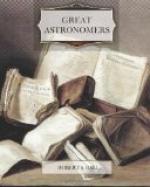The practical utilities of astronomy were also obvious in primeval times. Maxims of extreme antiquity show how the avocations of the husbandman are to be guided by the movements of the heavenly bodies. The positions of the stars indicated the time to plough, and the time to sow. To the mariner who was seeking a way across the trackless ocean, the heavenly bodies offered the only reliable marks by which his path could be guided. There was, accordingly, a stimulus both from intellectual curiosity and from practical necessity to follow the movements of the stars. Thus began a search for the causes of the ever-varying phenomena which the heavens display.
Many of the earliest discoveries are indeed prehistoric. The great diurnal movement of the heavens, and the annual revolution of the sun, seem to have been known in times far more ancient than those to which any human monuments can be referred. The acuteness of the early observers enabled them to single out the more important of the wanderers which we now call planets. They saw that the star-like objects, Jupiter, Saturn, and Mars, with the more conspicuous Venus, constituted a class of bodies wholly distinct from the fixed stars among which their movements lay, and to which they bear such a superficial resemblance. But the penetration of the early astronomers went even further, for they recognized that Mercury also belongs to the same group, though this particular object is seen so rarely. It would seem that eclipses and other phenomena were observed at Babylon from a very remote period, while the most ancient records of celestial observations that we possess are to be found in the Chinese annals.
The study of astronomy, in the sense in which we understand the word, may be said to have commenced under the reign of the Ptolemies at Alexandria. The most famous name in the science of this period is that of Hipparchus who lived and worked at Rhodes about the year 160BC. It was his splendid investigations that first wrought the observed facts into a coherent branch of knowledge. He recognized the primary obligation which lies on the student of the heavens to compile as complete an inventory as possible of the objects which are there to be found. Hipparchus accordingly commenced by undertaking, on a small scale, a task exactly similar to that on which modern astronomers, with all available appliances of meridian circles, and photographic telescopes, are constantly engaged at the present day. He compiled a catalogue of the principal fixed stars, which is of special value to astronomers, as being the earliest work of its kind which has been handed down. He also studied the movements of the sun and the moon, and framed theories to account for the incessant changes which he saw in progress. He found a much more difficult problem in his attempt to interpret satisfactorily the complicated movements of the planets. With the view of constructing a theory which should give




